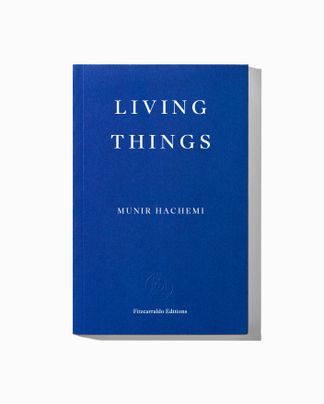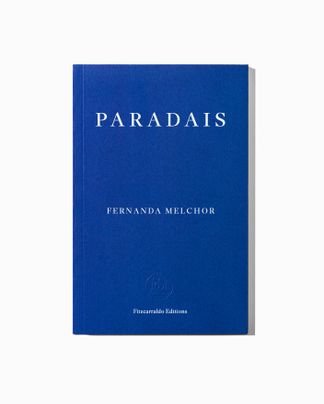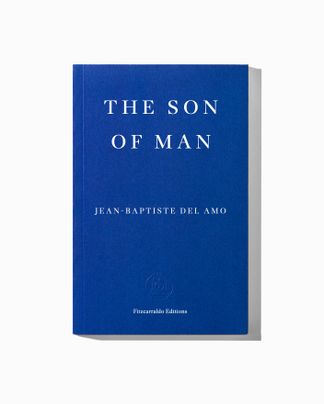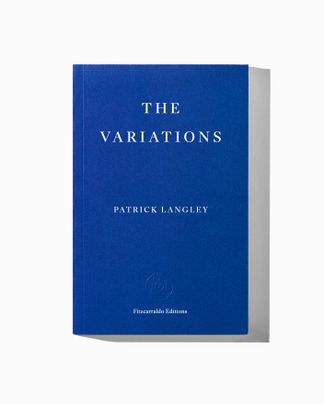Still Born, Guadalupe Nettel’s fourth novel, explores one of life’s most consequential decisions – whether or not to have children – with her signature charm and intelligence. Alina and Laura are independent and career-driven women in their mid-thirties, neither of whom have built their future around the prospect of a family. Laura has taken the drastic decision to be sterilized, but as time goes by Alina becomes drawn to the idea of becoming a mother. When complications arise in Alina’s pregnancy and Laura becomes attached to her neighbour’s son, both women are forced to reckon with the complexity of their emotions. In prose that is as gripping as it is insightful, Still Born explores maternal ambivalence with a surgeon’s touch, carefully dissecting the contradictions that make up the lived experiences of women.
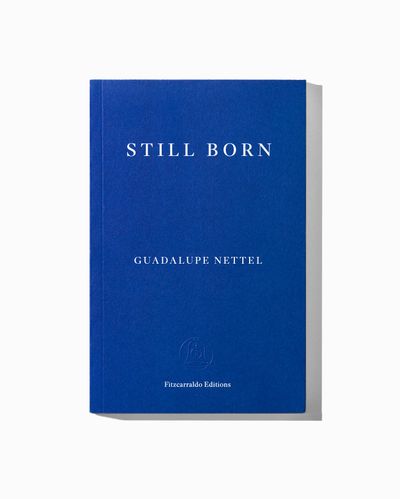
Still Born
Translated by Rosalind Harvey
French paperback with flaps, 219 pages | Audiobook read by Rachael Schwab
Published 22 June 2022 | Shortlisted for the 2023 International Booker Prize
Still Born
Translated by Rosalind Harvey
I .
A couple of weeks ago some new neighbours moved into the apartment next door. It’s a woman with a little boy who seems dissatisfied with life, to say the least. I’ve not seen him yet, but I can tell this just by listening to him. He comes back from school at around two in the afternoon, when the smell of cooking that emerges from his house wafts along the hallways and down the stairs of our building. Everyone knows when he’s arrived from the impatient way that he presses the buzzer. As soon he has closed his own front door, the decibel level increases as he starts shouting to complain about what’s for lunch. Judging by the smell, the food in his house cannot be either healthy or tasty, but the boy’s reaction is undoubtedly over the top. He hurls insults and profanities around, which is somewhat disconcerting in a child of his age. He also slams doors and throws all sorts of things at the walls. These outbursts tend to last a long time. Since they moved in, I’ve heard three of them, and on not one of those occasions was I able to listen all the way through, so I wouldn’t be able to say how they end. He shouts so loudly and so desperately that it forces me to leave the house in a hurry. I have to admit, I have never really got along well with children. If they approach me, I dodge out of the way, and if interacting with them is unavoidable, I don’t have the slightest idea of how to do so. I count myself amongst those people who, when they hear a baby crying on a plane or in a doctor’s waiting room, tense up completely, and are driven mad if the sound goes on for longer than ten minutes. However, it’s not that kids annoy me altogether. I might even find it entertaining watching them play in the park or tearing each other apart over some toy in the sandpit. They are living examples of how we would be as humans if the rules of etiquette and civility did not exist. For years I tried to convince my girlfriends that procreating was a hopeless mistake. I told them that children, no matter how sweet and loving they were in their best moments, would always represent a limit on their freedom, an economic burden, not to mention the physical and emotional cost they bring about: nine months of pregnancy, another six or more of breastfeeding, frequent sleepless nights during infancy, and then constant anxiety throughout their teenage years. ‘What’s more, society is designed so that it’s us, and not men, who take on the responsibility of caring for children, and this so often means forfeiting your career, your solo pursuits, your erotic side and sometimes your relationship with your partner, too,’ I would tell them, vehemently. ‘Is it really worth it?’
II.
At that time in my life, travelling was very important to me. Touching down in far-off countries I knew very little about, crossing them by land, on foot or in ramshackle buses, and discovering their culture and cuisine were amongst the pleasures of this world which it never even occurred to me to consider giving up. I did part of my studies outside Mexico. Despite my precarious existence back then, I now see this time as the most light-hearted phase of my life. A little bit of booze and a couple of friends were all that were needed to transform any evening into a party. We were young and, unlike now, staying up late did not take a toll on our bodies. Living in France, even with very little money, gave me the chance to explore other continents. When I stayed in Paris, I spent many hours reading in libraries, going to the theatre, and hanging out in bars and nightclubs. None of this is compatible with motherhood. Women with children cannot live that way. At least not during the first few years of the child’s upbringing. In order to allow themselves a simple afternoon at the cinema or dinner at someone else’s house, they need to plan far in advance, get hold of a babysitter, or convince their husbands to take care of the children for them. This is why, whenever things started to get serious with a man, I would explain to him that with me he could never reproduce. If he argued or some sign of sadness or dissent began to surface on his face, I would immediately cite the earth’s overpopulation, a compelling reason and one that was sufficiently humanitarian to prevent him from branding me as bitter or, worse still, selfish, as those of us who have decided to escape the role historically accorded to our sex tend to be called.
Unlike my mother’s generation, for whom it was abnormal not to have children, many women in my own age group chose to abstain. My friends, for instance, could be divided into two groups of equal size: those who considered relinquishing their freedom and sacrificing themselves for the sake of the species, and those who were prepared to accept the disgrace heaped on them by society and family as long as they could preserve their autonomy. Each one justified their position with arguments of substance. Naturally, I got along better with the second group, which included Alina.
We met in our twenties, during that period which is still considered the best age to procreate in many societies, although we both felt a similar aversion to what we used to call, looking knowingly at each other, ‘the human shackles’. I was studying for a PhD in literature, and neither my student grant nor my freelance status came close to providing me with any sort of financial security. Alina had a demanding but well-paid job at an arts centre and was doing all she could to train at the same time in arts and cultural management. Although her income was double mine, she sent a large part of it back home to her family: her father had been ill for several years, and lived alone in a village in Veracruz, while her mother was trying to get over a recent stroke. Alina had arrived very early at that stage of life when our parents depend upon us. How would she have been able to take care of a child on top of that?
In that period of my life, I was a big fan of the art of divination in all its forms, palmistry and tarot in particular. I remember that one day, after a long party whose aftermath included two broken glasses and a graveyard of empty bottles out on the balcony, Alina and I were alone in my apartment. We sat and listened to the footsteps of the last guest to leave echo down the Rue Vieille du Temple, utterly deserted at that early hour. I asked if she would let me read her cards. She agreed, purely to humour me, since she’s always been a pragmatic woman and found the idea of receiving messages from invisible forces completely ridiculous. The tarot must have seemed like a game to her, like any other. The spread I chose that night was an ambitious one and encompassed the rest of her life. Alina cut the pack a few times, then placed it on the table, in the positions I showed her. When all the cards were in place, I began turning them over slowly, partly because of how drunk I was, partly to give the moment a touch of theatre. Meanwhile, the story gradually appeared, the way a photograph is revealed when we plunge it into silver nitrate. In the middle of the layout were The Empress, the Six of Swords, Death and the Hanged Man. Death – the thirteenth arcana, which in many tarot decksdoes not even have a name – is a card that doesn’t always mean an actual passing, but brings with it a profound, radical change. Everything pointed towards a tragedy that would upset the course of her existence, perhaps even cut it short in one fell swoop. I was forced to hide my vexation. Alina must have noticed my disconcerted expression because she asked, her voice worried, what it was that I was reading.
‘It says here that you’ll be a mother and that your life will become totally cloistered,’ I blurted out, with a playful grin.
Alina shook her head vehemently and laughed, no doubt assuming I was pulling her leg. But her large black eyes stared questioningly at me and in their depths I made out a glimmer of unease. We carried on drinking and a couple of hours later, when we had finished the last bottle of wine, I said goodbye to my friend at the door to the apartment block. I climbed the stairs back up to my place and got into bed, feeling frightened by what I had seen.
(…)
‘Still Born is an astonishingly elegant, intelligent, affecting novel, which has stayed in my mind from the moment I began it to long after I finished. I felt a huge sense of relief that I had encountered a work of art about ambivalence in mothering, which encompassed a true, authentic range of emotions and curiosities – vanity, aggression, jealousy and selfishness – with sanguine acceptance, as well as the beautiful and difficult project of giving and sustaining love which marks all our lives, mothers or otherwise.’
— Megan Nolan, author of Acts of Desperation
‘In Still Born, Guadalupe Nettel renders with great veracity life as it is encountered in the everyday, taking us to the heart of the only things that really matter: life, death and our relationships with others. All of these are contained in the experience of motherhood, which this novel explores and deepens.’
— Annie Ernaux, author of The Years
‘Still Born is a rare thing: an unsentimental analysis of the ambivalences and moral complexity of motherhood. It is a book which demands to be discussed, at length, with friends, and I longed to do so.’
— Jessie Greengrass, author of The High House
‘Nettel is one of the leading lights in contemporary Latin American literature…. I envy how naturally she makes use of language; her resistance to ornamentation and artifice; and the almost stoic fortitude with which she dispenses her profound and penetrating knowledge of human nature.’
— Valeria Luiselli, author of Lost Children Archive
‘Still Born is a startling novel about whatever it is that drives adults to take care of children, and all the many things that make that care painful and sometimes impossible. There is a quiet force to the poised and deliberate writing. The novel is a deep exploration of affection and vulnerability.’
— Caleb Klaces, author of Fatherhood
‘I read Still Born in less than a day. It is perfect: deeply feminist, wise, funny and alive. Nettel is generous to each of her characters, and in prose that is crisp and light. I love this book.’
— Yara Rodrigues Fowler, author of there are more things
‘An unflinching, compassionate meditation on mothers, daughters and sisters – both blood-related and chosen – Still Born stirred me and consoled me, renewing my faith in the power of women’s communities. Guadalupe Nettel has managed the impossible task of writing a work of both exacting honesty and immense tenderness, on one of the most delicate topics.’
— Livia Franchini, author of Shelf Life
‘Deeply intelligent, Still Born is a propulsive novel with a depth of feeling so woven into the language that it never feels worn or applied. The denatured quality of the tone means the ideas of the book – the suspicion of the body as having incompatible desires from the mind; the impulses versus the aversions to child-having; the complexities of the mother-child dynamic – all just absolutely sing. I loved it.’
— Susannah Dickey, author of Common Decency
‘I love the work of Guadalupe Nettel, one of Mexico’s greatest living writers. Her fiction is brilliant and original, always suffused with sensuality and strange science.’
— Paul Theroux, author of The Mosquito Coast
‘Nettel is free. She has succeeded in creating an audacious narrative style all her own, a singular and fearless way of being in the world. An essential voice of the new Latin American literature.’
— Enrique Vila-Matas, author of Mac’s Problem
‘Guadalupe Nettel reminds us that there is nothing stranger than our existence lived in containers of meat, blood and madness.’
— Mariana Enríquez, author of The Dangers of Smoking in Bed
‘Rosalind Harvey skilfully translates the original Spanish into precise and plain, but deeply moving, prose. Without resorting to sentimentality, the novel charts its characters’ halting efforts to understand and comfort one another. It is a piercing reflection on the ways acts of care bind people together.’
— Economist
‘This highly original novel, in an excellent translation by Rosalind Harvey, pursues a range of ideas connected to children, who should have them and who should take care of them.… There’s a dark undertow to Still Born that reminded me of Elena Ferrante’s novels.’
— Miranda France, TLS
‘Solitude, the vulnerabilities of the body, unearthing the beautiful in the strange, outsiders who are unwilling to conform – these are some of [Nettel’s] interests … [and she] carries some of these concerns into Still Born…. The prose, which appears in an elegant translation by Rosalind Harvey, retains a matter-of-factness, and in some places a synoptic quality … that is rarely freighted with sadness or despair.’
— Sarah Resnick, London Review of Books
‘Nettel, translated by Rosalind Harvey, devotes tight prose to the complicated structure of identity around being (or not being) a mother and explores the constant negotiating women must do in the process. It’s a subject that’s well-trodden, but it’s still consistently treated as a universal experience – Nettel approaches mothering with originality and oceans of empathy.’
— Anna Cafolla, The Face
‘The writing is subtle, sharp, and beautifully rendered thanks to Rosalind Harvey’s smooth translation.’
— Buzz Magazine
‘Still Born embraces both the joys of motherhood, and all the milked-up gunk, guilt-tripping and agonising. The decisions made are never straightforward. But this novel is vital in its emphasis on the right for people to make their own choices about their own bodies.’
— The Big Issue
‘Beautifully rendered in English by Rosalind Harvey, Still Born addresses the taboo of being ambivalent to motherhood with an admirable honesty.… Still Born does the work of all impressive fiction; it creates conversation and generates ideas about the topics that are not as openly spoken about as they should be.’
—Hritik Verma, Hindustan Times
Guadalupe Nettel is a Mexican author of award-winning novels and short story collections. Her work has been translated into more than twenty languages and adapted for theatre and film. Still Born, her most recent novel, was shortlisted for the 2023 International Booker Prize. In 2008 she received a PhD in Literature from the EHESS in Paris. She has edited cultural and literary magazines such as Número Cero and Revista de la Universidad de México. She lives in Paris as a writer in residence at the Columbia University Institute for Ideas and Imagination.

